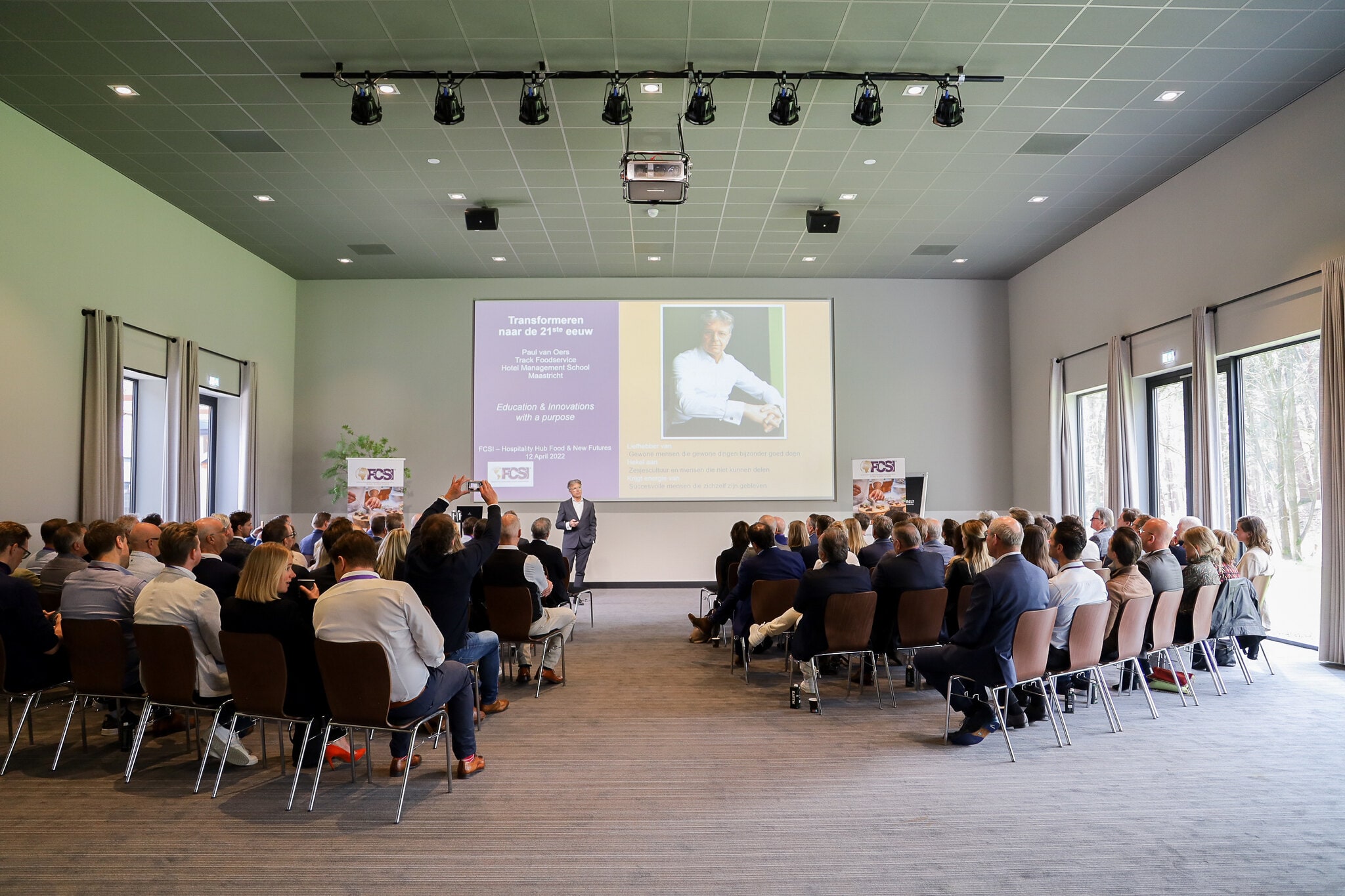
For return to this annual congress, postponed for two years due to Covid and held at Hotel de Werelt in Lunteren, the Chairman of the day was Maarten Wessels, who introduced the speakers, including Paul van Oers from the Hotel Management School Maastricht: Emma Kallen, sustainability consultant at Factor Delta; impact manager Kathelijn van Elk from Too Good To Go; and Jos Klerx, sector specialist hospitality and recreation at Rabobank.
Offering a view from the hotel management school, Paul van Oers addressed the changes brought about by youth. “GenZ is a generation that is purpose driven,” he said.
He described the new generation as one demanding changes and with a different way of looking at things. But Van Oers sounded a warning: “The youth and especially the millennials are critical and will ask questions about the products. If we don’t give them good answers, we are going to lose those young people. And without young people, the food service industry has no future,” he said.
Furthermore, Van Oers urged delegates to stop speaking of foodservice and food retail and instead speak of food business. “Those two food worlds are increasingly intertwined, so food business better covers the load. And we have to offer young people something if we want to continue to attract them. Now many initiatives from the past are ‘burning platforms’, they don’t matter anymore. For example, there are 85% fewer applications for hospitality and foodservice in all kinds of disciplines. Food training should therefore become faster, more effective and based on collected data.”
Disruptive innovation platform
Van Oers also dreams of a disruptive innovation platform for HBO+ Food Business Talents. “A platform where the most crazy and disruptive ideas are developed. Where anything is supported and nothing is impossible. A platform for rebels, innovators and dissenters. Strong individuals who use their own talents as a compass and who know that analog knowledge is no longer good enough.”
Awareness
Jan Klerx of Rabobank highlighted another threat to the foodservice market, namely that of the availability of basic ingredients and food waste. The two are equally important, according to Rabobank’s sector specialist hospitality and recreation.
“By 2050, we will collectively have to produce 60 percent more if we are to have food and drink for everyone. Every month, five million mouths that need feeding are added to the world. And already 800 million people are permanently hungry,” he explained. “Everyone knows that all is not fairly distributed in the world, but the fact that by reducing food waste in the Western world the hunger problem can be solved, is not clear to everyone.”
Worldwide, about a third of the food produced is wasted. It is, theoretically, about four times the amount needed to feed more than 800 million people who suffer from hunger. By 2030, food waste must be reduced by 50%. In the European Union, €30bn worth of food is lost to consumers and another €60bn in the production process. This is especially true for perishable foods, such as meat, fruits and vegetables. Huge amounts, which is not only a waste of raw materials, but also of money and unnecessary CO2 emissions. According to Klerx, it already helps if people are aware of food waste. Previous tests have shown that companies that participated in a Food Waste Challenge had already reduced food waste by 15% in eight weeks.
Too Good To Go
The contribution by Kathelijn van Elk of Too Good To Go also focused on food waste. The organization, which is now active in 17 countries, has developed an app to combat this waste. Many supermarkets, healthcare institutions and food service companies work with the app. In Too Good To Go app consumers can buy so-called Magic Boxes. The bakeries, cafes, restaurants and supermarkets that are affiliated with the app fill the boxes with everything they have left over that day. So, the content varies from day to day, that’s the magic. Box prices vary between €3 and €5 and can be picked up the next day.
Bread is by far the product that is thrown away the most. Every day, 800,000 loaves of bread are thrown away in the Netherlands. An unimaginable amount. But the quantities of other products do not lie either. According to Van Elk, an important factor for discarding is the use-by date on the packaging. It is responsible for 10% of the food waste. She advocates using the senses to determine whether food is still good. Color and smell show when a product can no longer be consumed.
Measuring
Emma Kallen also focused on the theme of food waste. This is important, not only because of the environmental impact but it is also of economic importance. The consultancy firm Factor Delta has a rule of thumb that every euro spent on tackling food waste in a company can pay for itself up to fourteen times over.
So, there is every reason to pay attention to this issue. According to Kallen, the focus within foodservice is on cooking the right amount. Measuring is very important in this context. And then discuss the data with all those responsible, buyers, production/kitchen staff and possibly also with suppliers. That way, according to the consultant, you get a better overview of the root causes of waste.
Source: @FoodClicks
